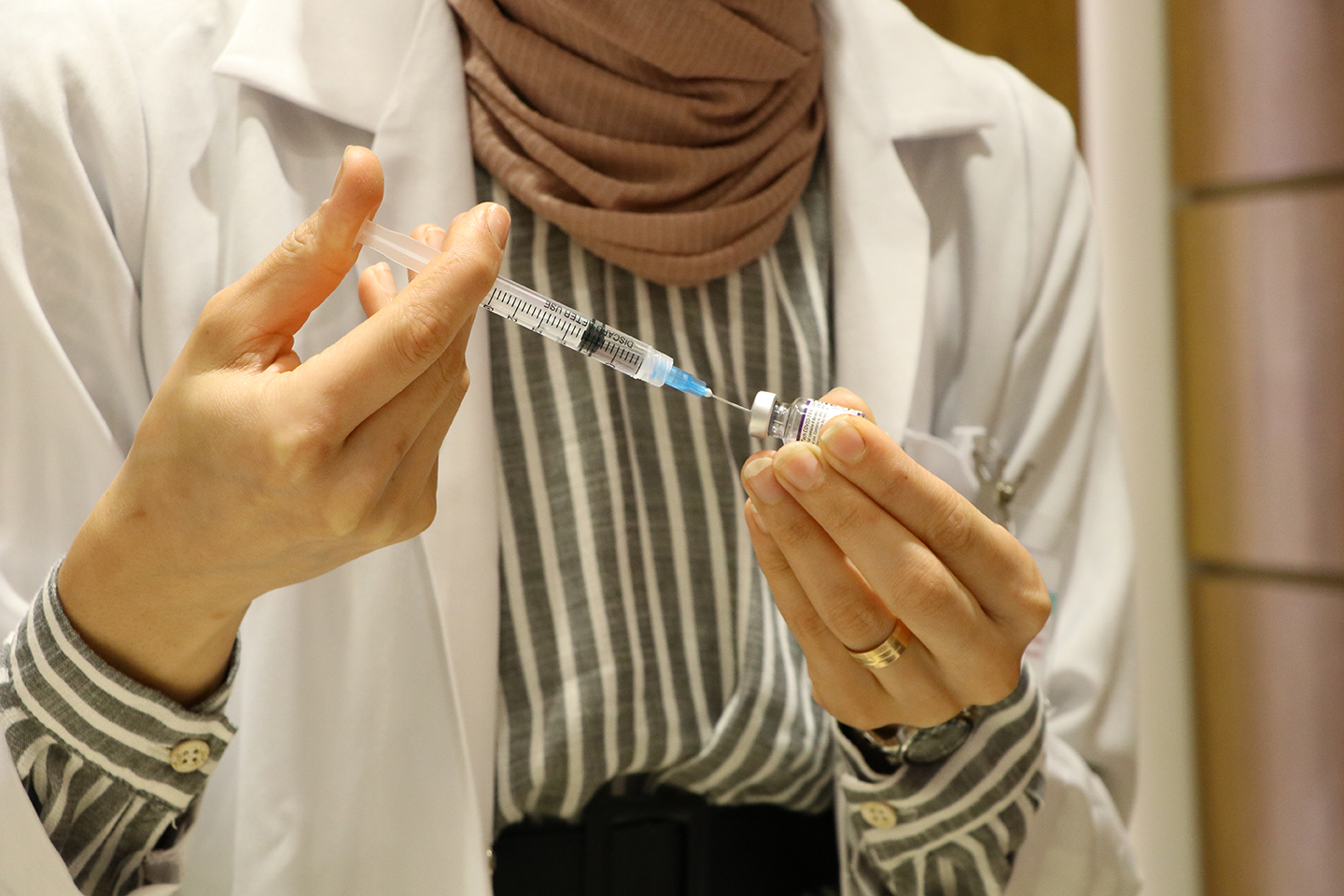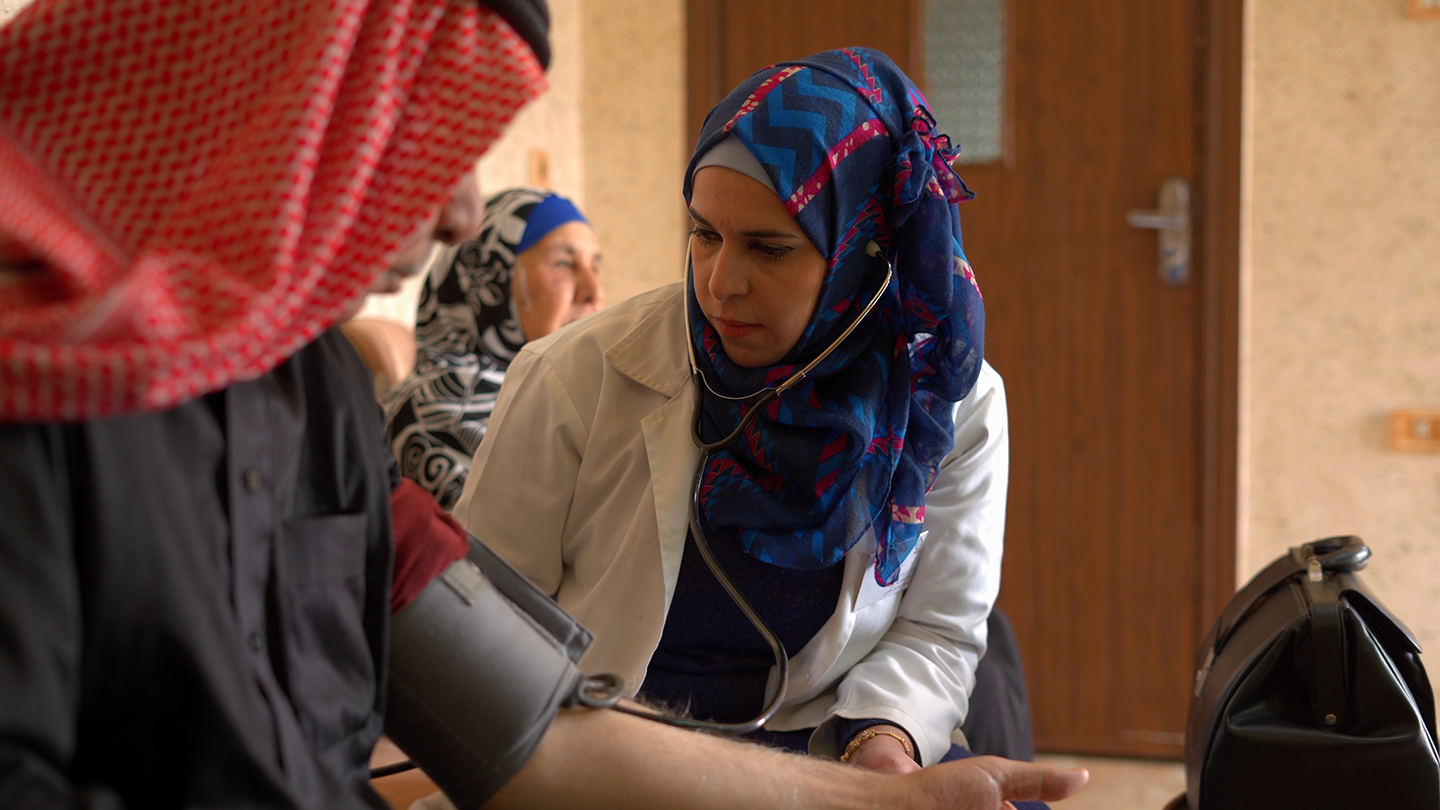
© Mustafa Altamimi
COVID-19 and NCDs in the Eastern Mediterranean Region
As of 27 March 2022, there have been more than 21 million COVID-19 confirmed cases in the WHO Eastern Mediterranean Region, more than 20 million recovered, and more than 340 000 deaths. The case fatality rate is 1.6% and the recovery rate is 96.7% [1].
The COVID-19 pandemic and the noncommunicable disease (NCD) epidemic have brought about a deadly interplay. People living with NCDs are vulnerable to becoming severely ill and dying from COVID-19, which holds true since the beginning of the pandemic. In some countries, the risk of dying among hospitalized COVID-19 patients with diabetes was roughly four times higher than those without diabetes.
In addition, essential NCD services were disrupted due to the COVID-19 pandemic. According to the NCD country capacity assessment conducted at global level between June and October 2021, more than 40% of countries faced partially or completely disrupted NCD services, with the highest disruption in diabetes services and management of diabetic complications (more than 60%) globally [2]. According to the survey on maintaining essential NCD services conducted at regional level between October and November 2021, more than 8% of countries in the Region faced partially or completely disrupted NCD services, with the highest disruption in cardiovascular disease services (11%) [3].

© WHO
Common co-morbidities related to severe COVID-19 illness
According to guidance published by WHO, the Centers for Disease Control and Prevention, and Public Health England, people living with these underlying conditions are associated with increased risk of severe COVID-19 [4].
- Cardiovascular diseases
- Chronic kidney disease
- Chronic respiratory diseases
- Chronic liver disease
- Diabetes
- Cancers
- HIV/AIDS
- Tuberculosis (active)
- Chronic neurological disorders
- Sickle cell disorders
- Tobacco smoking
- Severe obesity (BMI ≥40)
- Hypertension
Advice on COVID-19 vaccines for people living with NCDs
All people, 18 years and older, living with NCDs, with stable and controlled conditions, are recommended to take COVID-19 vaccines. All COVID-19 vaccines included in the Emergency Use Listing validated by WHO are safe for most people 18 years and older, including those with pre-existing conditions such as: hypertension; diabetes; asthma; pulmonary, liver and kidney disease; as well as chronic infections that are stable and controlled [5].
Vaccination is also recommended for people living with NCDs who face acute emergencies such as acute myocardial infraction or acute stroke when their conditions are stable and after discussions with their healthcare providers. [5]
Vaccines included in the Emergency Use Listing validated by WHO
As of 12 January 2022, these vaccines have obtained Emergency Use Listing by WHO [6].
The Pfizer/BioNTech Comirnaty vaccine, 31 December 2020.
The SII/COVISHIELD and AstraZeneca/AZD1222 vaccines, 16 February 2021.
The Janssen/Ad26.COV 2.S vaccine developed by Johnson & Johnson, 12 March 2021.
The Moderna COVID-19 vaccine (mRNA 1273), 30 April 2021.
The Sinopharm COVID-19 vaccine, 7 May 2021.
The Sinovac-CoronaVac vaccine, 1 June 2021.
The Bharat Biotech BBV152 COVAXIN vaccine, 3 November 2021.
The Covovax (NVX-CoV2373) vaccine, 17 December 2021.
The Nuvaxovid (NVX-CoV2373) vaccine, 20 December 2021.
COVID-19 and NCDs
A healthy lifestyle will make all bodily functions work better, including immunity for all people and people living with NCDs [7]. Key components of a healthy lifestyle are:
eating a healthy diet;
keeping physically active;
quitting smoking;
limiting or avoiding alcohol intake; and
getting enough sleep.
The following additional components are recommended to keep conditions under control and stable:
regular checking of parameters such as blood pressure and blood sugar;
regular medications; and
regular follow ups with healthcare providers.
References
[1] Eastern Mediterranean Regional Office COVID-19 dashboard. Cairo: World Health Organization Regional Office for the Eastern Mediterranean; 2022 (https://dashboards.emro.who.int/EMDashboardHub/user/dashboard/13).
[2] Presentation of preliminary results of 2021 assessment on NCD service disruption during COVID-19 pandemic. Geneva: World Health Organization; 2021 (https://www.who.int/publications/m/item/presentation-of-preliminary-results-of-2021-assessment-on-ncd-service-disruption-during-covid-19-pandemic).
[3] Survey on maintaining essential noncommunicable disease services in the Eastern Mediterranean Region during the COVID-19 pandemic. Cairo: WHO Regional Office for the Eastern Mediterranean; Unpublished.
[4] COVID-19 and co-morbidities in the Americas: frequently asked questions. Washington, D.C.: Regional Office for the Americas of the World Health Organization; 2020 (https://www.paho.org/en/documents/covid-19-and-co-morbidities-americas-frequently-asked-questions-faq).
[5] COVID-19 advice for the public: getting vaccinated. Geneva: World Health Organization; 2022 (https://www.who.int/emergencies/diseases/novel-coronavirus-2019/covid-19-vaccines/advice).
[6] Coronavirus disease (COVID-19): vaccines. Geneva: World Health Organization; 2022 (https://www.who.int/news-room/questions-and-answers/item/coronavirus-disease-(covid-19)-vaccines).
[7] NCDs, mental health and COVID-19. Geneva: World Health Organization; 2020 (https://www.who.int/news/item/06-05-2020-ncds-mental-health-and-covid-19).
Related links
COVID-19 advice for the public: getting vaccinated
The Pfizer BioNTech (BNT162b2) COVID-19 vaccine: What you need to know








